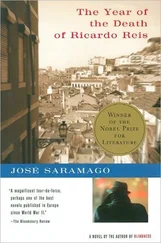The Registrar got up, I'll leave the key here, I have no intention of using it again, and he added, before Senhor José could say anything, There is still one last thing to resolve, What's that, sir, There's no death certificate in the unknown woman's file, I didn't manage to find it, it must be somewhere back there in the archive, or perhaps I dropped it on the way, As long as it remains lost, that woman will be dead, She'll be dead whether I find it or not, Unless you destroy it, said the Registrar. Having said that, he turned his back, and shortly afterwards came the sound of the door to the Central Registry closing. Senhor José stood in the middle of the room. There was no need to fill in a new card because he already had a copy in the file. He would, however, have to tear up or burn the original, where the date of death was registered. And there was still the death certificate. Senhor José went into the Central Registry, walked over to the Registrar's desk, opened the drawer where the flashlight and Ariadne's thread were waiting for him. He tied the end of the thread around his ankle and set off into the darkness.
1. How do the Central Registry's hierarchy of authority and the operating procedures reflect those of institutions, groups, and other bureaucracies with which you are familiar? In what ways might they be said to represent the structure and workings of society itself?
2. Including "the labyrinthine catacombs of the archive of the dead," (5) what labyrinths and mazes—external and internal—appear in the novel? What purpose do they serve? How do Senhor José and others navigate them? What perils and rewards are associated with them?
3. In what way does Senhor José's accidental possession and examination of the card belonging to a woman of thirty-six bring him "face-to-face with destiny"? (25) What attracts him to this specific card and its person? How does that "destiny" subsequently unfold? How might he have changed his destiny in this regard?
4. Senior José's ceiling—"the multiple eye of God"—doesn't believe his claim that he paid a nighttime visit to the street where the unknown woman was born, "Because what you say you did doesn't fit with my reality and what doesn't fit with my reality doesn't exist." (31) How does this notion that objective reality depends on conformity to an individual's perceived reality recur through All the Names?
5. How do fear, timidity, and anxiety affect Senhor José's thinking and behavior? What enables him to overcome his mild manners, timidity, and anxieties and act deceptively and—in some instances—with despotic authority, much like the Registrar?
6. What roles do chance and coincidence play in Senhor José's endeavors? To what degree is he aware of the importance of chance and coincidence? What does the narrator have to say about the part they play in all our lives?
7. In what ways, and why, do Senhor José's endeavors soil and bruise both his body and his spirit? Why might the sullying and bruising be necessary stages in his progress? When he looks at himself in the school bathroom mirror, Senhor José is surprised at his filthy state. "It doesn't even look like me, he thought, and yet he had probably never looked more like himself." (91–92) In what ways might this be so?
8. The narrator refers to Senhor José's "highly efficient deductive mechanism." (84) What instances are there of that mechanism at work? How do Senhor José's powers of deduction serve him well, especially in light of his physical and emotional frailties? In what instances do those powers fail him, and why?
9. What comprises the "knowledge of the night, of shadows, obscurity and darkness" that Senhor José has acquired over the years and "that makes up for his natural timidity"? (87) What kinds of obscurity and darkness occur in All the Names, and how does Senhor José deal with them? What internal and external darknesses must he cope with? What sources of light can he draw on to illuminate the internal darkness, on the one hand, and the external darkness, on the other?
10. Why does the Registrar suddenly begin to show concern for, and act on behalf of, Senhor José's well-being, and subsequently take unprecedented actions to transform the hidebound structure and operations of the Central Registry? To what extent is Senhor José responsible for this shocking transformation in the Registrar himself?
11. "Meaning and sense were never the same thing," writes Saramago; "meaning shows itself at once, direct, literal, explicit, ... while sense cannot stay still, it seethes with second, third and fourth senses, radiating out in different directions that divide and subdivide...." (112) How might this digression on meaning and sense characterize both Senhor José's experience and Saramago's technique as a novelist? What shifting patterns of meaning and sense occur throughout All the Names?
12. When Senhor José returns to work after recovering from the flu, the Registrar solemnly declares, "Loneliness, Senhor José, ...never made for good company, all the great sadnesses, great temptations and great mistakes are almost always the result of being alone in life..." (117) What sadnesses, temptations, and mistakes has Senhor José's loneliness occasioned? In what way are they transformed or reinforced by his quest? How does Saramago present the conflict between withdrawal, isolation, and loneliness, on the one hand, and connection and relationship, on the other?
13. How does the Registrar interpret what he calls "the double absurdity of separating the dead from the living," (176) and what are the implications of his explanation of the two absurdities? What other interpretations of that double absurdity are possible?
14. What is the significance that the General Cemetery is entered "via an old building with a facade which is the twin sister of the Central Registry facade"? (180) In what way do other historical, organizational, and administrative details establish a correspondence between the General Cemetery and the Central Registry? In what ways do the two institutions differ?
15. What would you say is, finally, "the essence of the strange adventure into which chance" has plunged Senhor José? (200)
16. In what instances and in what ways do truths become lies and lies become truths, in All the Names'? Why does the distinction between truth and He seem at times so insubstantial? How might the transformations between truth and lie be related to the transformations between life and death?
17. What is the significance of Senhor José's dream in which he finds himself in the cemetery, where sheep continually change numbers, a voice repeatedly calls, "I'm here," and the sheep disappear leaving the ground strewn with numbers "all attached end to end in an uninterrupted spiral of which he himself was the centre"? (208–209) In what ways is Senhor José himself the center and the objective of his search? In his search for the unknown woman, how does Senhor José come closer and closer to finding his own true self?
18. We are told that Senhor José, as he postpones entering the unknown woman's apartment building, "both wants and doesn't want, he both desires and fears what he desires, that is what his whole life has been like." (228–229) What patterns of wanting and not wanting, of desiring and fearing have emerged during the several days through which we have followed Senhor José in his quest? What other personal contradictions has he exhibited?
19. What does the unknown woman ultimately represent for Senhor José, for Saramago, and for us? Why, even when Senhor José has her faculty card before him, have we not learned her name?
20. What interpretations might be given of our final view of Senhor José, tying the end of Ariadne's thread around his ankle and setting off into the darkness?
Читать дальше












